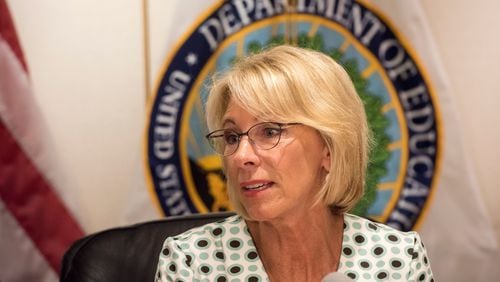As expected, U.S. Secretary of Education Betsy DeVos today proposed new guidelines on how campuses investigate and decide sexual misconduct allegations. Her proposals narrow the definition of sexual harassment and allow accused students to cross-examine their accusers through a third-party.
"Throughout this process, my focus was, is, and always will be on ensuring that every student can learn in a safe and nurturing environment," said DeVos in a statement. "That starts with having clear policies and fair processes that every student can rely on. Every survivor of sexual violence must be taken seriously, and every student accused of sexual misconduct must know that guilt is not predetermined. We can, and must, condemn sexual violence and punish those who perpetrate it, while ensuring a fair grievance process. Those are not mutually exclusive ideas. They are the very essence of how Americans understand justice to function."
Now that the department has released its proposed overhaul to Title IX, a law protecting people from gender discrimination in programs or activities that receive federal funds, the public has 60 days to comment. Advocates for victims of sexual abuse offered immediate rebukes to the DeVos revamping, which they contend will lead to fewer victims coming forward.
The rewrite of the Obama-era guidelines would elevate the evidence required to substantiate wrongdoing from a "preponderance” to "clear and convincing," which is a higher standard. It’s clear from the proposed changes that DeVos took to heart complaints of parents, including some in Georgia, that their sons were wrongfully accused and had little opportunity to challenge the accusation. The overhaul permits students to bring in third-party representatives such as attorneys to conduct cross-examinations.
In a statement, the federal Ed Department said: "The proposed rule would require schools to apply basic due process protections for students, including a presumption of innocence throughout the grievance process; written notice of allegations and an equal opportunity to review all evidence collected; and the right to cross-examination, subject to 'rape shield' protections.”
While sexual harassment had been broadly defined as “unwelcome conduct of a sexual nature,” the proposal narrows the scope and identifies three categories:
-Unwelcome conduct on the basis of sex that is so severe, pervasive and objectively offensive that it effectively denies a person equal access to the school's education program or activity.
-Quid pro quo harassment such as a professor conditioning an educational benefit on a sexual act from a student.
-Sexual assault.
“The proposed rule, if adopted, will mean that fewer survivors will report their assaults and harassment, schools will be more dangerous, and more students will be denied their legal right to equal access to education after experiencing assault and harassment,” said National Education Association President Lily Eskelsen García. “This Trump-DeVos agenda would return schools to a time when rape, assault, and harassment were swept under the rug. Title IX is essential to protecting each student's right to equal access to education and an educational experience free from sexual violence and harassment.”
But the DeVos rewrite also drew praise. “The department’s approach seems to balance fairness and support for survivors,” said U.S. Senator Lamar Alexander, R-Tenn., chairman of the Senate’s education committee. “Under the previous administration, a single employee at the Education Department was issuing edicts to 6,000 colleges and universities on how to handle the complex and sensitive problem of sexual assault. In the meantime, colleges are still required to follow the Title IX law and the Clery Act, and Congress will continue to examine the clarity and effectiveness of those laws to keep students safe.”
Samantha Harris, vice president of procedural advocacy at the Foundation for Individual Rights in Education, a nonpartisan civil liberties organization, said, “By taking the rights of both complainants and accused students seriously, these proposed regulations make important strides toward ensuring that complaints of sexual misconduct will be neither ignored nor prejudged. FIRE has long argued that everybody on campus benefits from fundamentally fair proceedings. While not perfect, the proposed regulations indicate the federal government’s recognition that students accused of serious misconduct are entitled to meaningful due process rights, and the proposed regulations include a number of important procedural protections that will improve the integrity of the process for everyone.”







